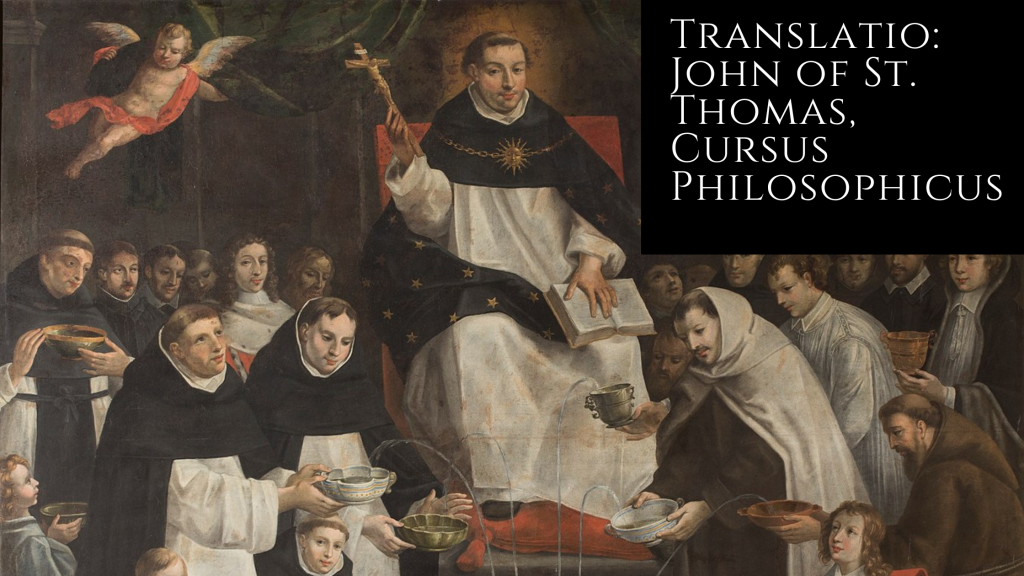Cursus Philosophicus Thomisticus
Second Volume: Natural Philosophy
First Part
Proem.
Philosophy, if it is taken in the whole breadth of its signification, includes every science, for Philosophy is said [to be] as if love or friendship of science: for which reason human reason is called Philosophy by St. Thomas in the preface [of the commentary on the Politics]. And thus Philosophy is generic science including beneath itself every science naturally acquirable, especially speculative [science], love of which is properly love of science, since [in love of speculative science] to know alone is loved. Of this however a threefold genus is numbered by the Philosopher, and St. Thomas, in II Metaphysics, lecture vii, and in the little work lxx, q. [?], namely natural science, mathematics, and metaphysics, reductively however there is also placed beneath it logic, which deals [agit] not about things to be speculated about, but about instruments of speculation. These sciences differ according to a diverse grade of knowability, as we have said in books Post. q. xxvii. For natural science treats [tractat] of things subjected to motion and sensible change, and therefore abstracts [abstrahit] from singular matter. Mathematics deals about quantity, so that it abstracts from motion and matter clothed in sensible accidents. Metaphysics deals about being as such [ente ut sic], so that it abstracts from all matter, both sensible and intelligible, that is even primary matter according to itself [materia prima secundum se], which is perceived by the intellect alone.
Philosophy is defined in this breadth variously, however, taken from authorities. For some define Philosophy from the etymology of the name, which is love of wisdom; others from the mode of proceeding [modo procedendi], which is cognition of things as they are [cognitio rerum ut sunt], that is through their causes; others, from the matter which it comprehends, say that it is cognition of human and divine things; others, finally, from the effect to which it leads us, have said that Philosophy is contemplation of death, that is separating man from temporal things and bodily passions.
In the present work, however, we do not deal about Philosophy in its whole breadth; but having left behind Mathematics and Metaphysics, we only deal about natural science, the object of which comprehends every natural being [ens naturale], that is every being mobile according to some bodily or extended motion [motum corporeum seu extensum]; for purely spiritual motions do not pertain to this genus of science. In considering this object, however, Aristotle proceeded in the highest order, dividing four parts of this science. The first deals about mobile being in common [ente mobili in communi]: for one proceeds scientifically from the more common to the less common, and this part is enclosed in eight books which they call Physicorum or de Physica Auscultatione [i.e., the Physics]. The remaining three parts deal about mobile being in particular [ente mobili in particulari]; and three species of motion are distinguished proportionally [iuxta] into three genera of mobile beings [mobilium], as S. Thomas points out in the proem of the books on Generation [i.e. his commentary on De Generatione]. First is motion of place; second is of alteration, which is ordered to generation; third is of augmentation, which is proper of a living or animate thing. And according to the first motion are considered simple bodies, from which this universe are constructed. And thus after the books of the Physics the Philosopher treats of heaven and the world, that is of all simple bodies, to the extent that through local motion they are coordinated and situated in this universe; for from these especially the universe consists, for mixtures [mixta] have place in proportion to the measure [iuxta modum] of the predominate element in them. According to the motion of alteration, however, which is ordered to generation, he deals about corruptible bodies, not to the extent that they are coordinated through position [per situm] in the universe, but to the extent that they underlie [subiacent] generation and corruption, both substantial and accidental; and thus the third part of [natural?] Philosophy deals about generation. Finally, according to the third genus of motion, namely of augmentation and nutrition, which is proper to a living thing, is dealt about every grade of life, or about the soul, which furnishes that [i.e. life], and is ascended up to the grade of intellective life, which is found in our soul, and about this he deals in the books on the soul [i.e., De Anima]. And thus through those four parts is divided the whole natural science.
Notes:

Leave a comment